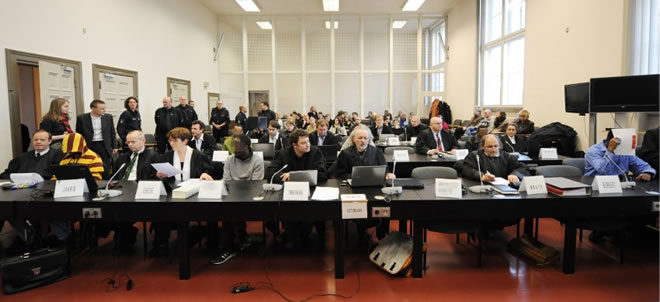When 10 Somali pirates were brought to trial earlier this year in Hamburg, many viewed it as promising a minor victory against lawlessness on the high seas. But the trial has turned into a pointless and expensive circus. The battle against piracy off the Horn of Africa won't be won in German courtrooms.


By Beate Lakotta
Wednesday, September 12, 2012
The first 100 days of anything new are generally considered an observation period. After that comes the thumbs up or thumbs down.
This week marks the 100th day of the Somali piracy trial in Hamburg, a case of the Federal Republic of Germany versus 10 Somalis who hijacked the German freighter cargo ship MV Taipan in the Indian Ocean in April 2010, armed with AK-47s.
Under the principle of universal jurisdiction, sea piracy may be prosecuted in any country, but few Western countries have attempted it. The Hamburg court, though, has taken a self-confident approach to this trial that has drawn international attention, as if saying: We can be global, too.
The regional court in Hamburg has had 100 days to demonstrate the point of transporting defendants from a poverty-stricken, seemingly archaic, lawless country thousands of kilometers in order to put them on trial. But, in the end, there is no point.
Four judges, four lay judges, two prosecutors, 10 other court employees, 20 defense attorneys and three Somali language interpreters -- along with numerous expert witnesses on subjects including conditions in war-torn Somalia, the estimation of age through carpal bone analysis, bullet holes and the Urdu language -- have jointly managed to bring to light no more than what was known from the start -- after all, the 10 defendants were caught red-handed by Dutch marines who stormed the ship.
What's the Point?
The idea was to use the defendants to get at the powerful figures behind them, the individuals who oversee this specific form of organized crime. The question is: How?
When the trial began in November 2010, the global media marveled at these 10 thin, dark-skinned men in T-shirts who had trouble providing exact answers to the judge's questions, replying that they were born "under a tree" or "during the rainy season." They were homesick. One pirate hoped for a quick execution; another suffered from depression. There were suicide attempts. The culture shock on both sides was considerable. Indeed, there's a reason the United Nations prefers for trials be held in the defendants' home region.
In a 20-minute closing address, the public prosecutors in Hamburg called for a total of 81 years in prison divided among the 10 defendants. But for what purpose? Deterrence? Resocialization? The prospect of a German prison sentence isn't going to make much of an impression on pirates in Somali, whose ransom intake rose from $110 million (€85 million) in 2010 to $170 million in 2011 -- in a country with an annual per capita income of $240.
And in which society would the pirates be resocialized after their prison sentences, in Somalia or Germany? The latter is more likely. Since they weren't deported back to Somalia, the defendants could stay here after serving their sentences -- and at public expense. This April, the court had to release the three youngest defendants since they had already been held in custody for two years. They are now attending school.
An Expensive Farce
The only other reason for punishment is as atonement for the crime. But how does one measure the guilt of 10 men from the land of the starving within the legal system of a land of full bellies? Even the captain of the Taipan showed sympathy in court -- not for the brutal industry of hijacking ships, but for the defendants. The shipping company, which incurred €1.06 million worth of losses as a result of theTaipan's hijacking, also declined to file a civil action.
The fight against piracy around the Horn of Africa won't be won in German courtrooms. The price tag of this trial -- around €35,000 for each day the court is in session -- only serves to prove that the trial itself is a legal luxury. Including all associated costs, this nonsense trial could end up devouring between €7 million and €10 million -- a sum equal to more than half the annual budget of the United Nations' anti-piracy program.
At Hamburg's justice department, a working group is examining whether such large-scale trials bring with them "a need to change national cost and procedural laws," in other words, who pays for such trials and how they are handled. Could they be thinking in terms of future piracy trials?
Thumbs down on that one, dear justice system. Anything but that!
Translated from the German by Ella Ornstein
Source: The Spiegel